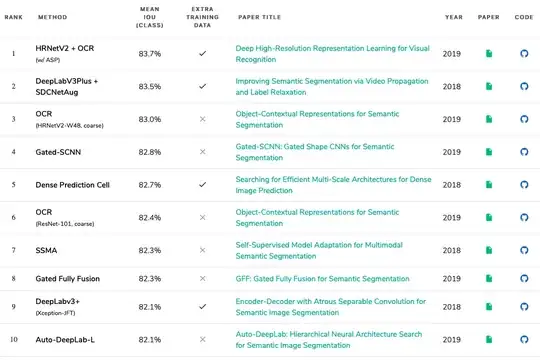I recently started looking for networks that focus on image segmentation tasks related to biomedical applications. I could not miss the publication U-Net: Convolutional Networks for Biomedical Image Segmentation (2015) by Ronneberger, Fischer, and Brox. However, as deep learning is a fast-growing field and the article was published more than 4 years ago, I was wondering if anyone knows other algorithms that yield better results for image segmentation tasks? And if so, do they also use a U-shape architecture (i.e. contraction path then expansion path with up-conv)?
- 39,006
- 12
- 98
- 176
- 41
- 2
-
You should try doing some research on your own through Google Scholar. According to it the paper that you linked has been referenced 8722 times. Here is a [link](https://scholar.google.hr/scholar?cites=10845403114495995712&as_sdt=2005&sciodt=0,5&hl=hr) to all the papers that reference it so try looking through it, you should definitely find something relevant. – Brale Oct 26 '19 at 18:35
-
1Here's a very related question (if not a duplicate): [What are some good alternatives to U-Net for biomedical image segmentation?](https://ai.stackexchange.com/q/19943/2444). – nbro Jun 13 '20 at 00:06
2 Answers
U-Net and U-Net inspired architectures have been quite popular in the medical image-related tasks ever since it was first introduced. There have been several improved versions of U-Net designed for specific tasks that followed. One such example is Attention U-Net, extremely popular for Pancreas Segmentation.
Other examples of architectures that have achieved state-of-the-art results in image segmentation tasks in recent years include Multi-Scale 3DCNN + CRF, popular for Brain and Lesion images, Multi-Scale Attention for MRIs, etc. A recent paper that describes an interesting 3D FCNN architecture is HyperDense-Net, widely used for multi-modal tasks in medical image segmentation.
- 31
- 2
You can find leaderboards as well as code at this address.
For now, HRNetV2 leads the game.
The U-Net architecture is part of a broad family of network architectures that aggregate multi-scale features to extract finer details useful for semantic segmentation. Examples are Feature Pyramidal Networks (FPN), Hourglass, Encoder-Decoder, MatrixNet, etc...
- 308
- 2
- 9
